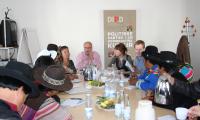Bolivia
A former pioneering country with democratic challenges
Until 1982, Bolivia experienced almost annual coups, with several dictatorships and only few democratic governments. The national economic crisis of the 1980’s also led to a weakening of Bolivia’s strong trade unions and its nationalized industries, especially the mining sector. Several movements, including former miners and indigenous communities, emerged, and started collaborating around 2000. Under the leadership of Evo Morales, a coca farmer unionist with an indigenous background, the Movement for Socialism (MAS-IPSP) was formed. The movement won the 2005 elections with the support of almost two-thirds of the population. Therefore, MAS-IPSP has a massive majority and has governed the country ever since.
MAS-IPSP has been through a series of both internal and external conflicts, partly due to its weak democratic structures. The political movement has expressed the need for a strengthened capacity to deal with the many social conflicts in a more dialogue-oriented and constructive way.
Population: 12,054,379.
Liberal Democracy Index: 0.35.*
[LDI encaptures both electoral and liberal aspects of democracy]
Proportions of Seats held by Women in Parlament: 46.2%**
Proportions of Seats held by Youth under 30 in Parlament: 6.15%**
*V-Dem Institute 2023
**IPU.org 2023
